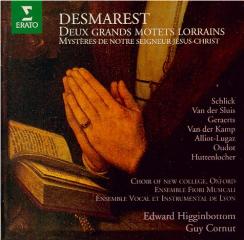Desmarest - Deux Grands Motets Lorrains • Mystères de notre seigneur Jésus-Christ (1995)
Desmarest - Deux Grands Motets Lorrains • Mystères de notre seigneur Jésus-Christ (1995)

Domine, Ne In Furore (Psaume VI) 1. Sym: Domine, Ne In Furore 2. Miserere Mei Domine 3. Et Anima Mea Turbata Est Valde 4. Convertere, Domine, Et Eripe Animam Meam 5. Quoniam Non Est Ine Morete Que Memor Sit Tui 6. In Inferno Autem Quis Confitebitur Tibi 7. Laboravi In Gemitu Meo 8. Turbatus Est A Furore Oculus Meus 9. Discedite A Me Omnes 10. Exaudivit Dominus Deprecationem Meam 11. Erubescant Et Conturbentur Vehementer Omnes Inimici Mei... Confitebor Tibi (Psaume CX) 12. Sym, Cordes: Confitebor Tibi Domine 13. Magna Opera Domini 14. Confessio Et Magnificentia Opus Ejus 15. Memoriam Fecit Mirabilium Suorum 16. Memor Erit In Saeculum Testamenti Sui 17. Ut Det Illis Hereditatem Gentium 18. Fidelia Omnia Mandata Ejus 19. Redemptionem Misit Dominus Populo Suo 20. Sanctum Et Terribile Nomen Ejus 21. Intellectus Bonus Omnibus Facientibus Eum Barbara Schlick – soprano Mieke Van der Sluis – soprano Harry Geraerts – counter-tenor Harry Van der Kamp – bass Choir of New College, Oxford Ensemble Fiori musicali Edward Higginbottom - conductor Mysteres De Notre Seignuer Jesus-Christ 22. 'Son Avenement': L'Enfant Est Arrive 23. 'Son Avenement': Noel, Noel, Benissons Le Ciel 24. 'Son Avenement': Noel Pour L'Amour De Marie 25. 'Son Avenement': Nuit Du Peche Dissipee 26. 'Son Avenement': Noel Rejouissance 27. 'Son Avenement': Chantons La Victoire 28. 'Ses Miracles-La Resurrection De Lazare': C'en Est Fait 29. 'Ses Miracles-La Resurrection De Lazare': Que Dis-Je O Ciel 30. 'Sa Passion': Sauveur, Divin Sauveur 31. 'Sa Resurrection': O Soleil, Hate-Toi 32. 'Sa Resurrection': Bergers, Reprenez Vos Musettes 33. 'Sa Resurrection': Chantez, Peuples Chantez 34. 'Descente Du Saint-Espirit': Priere 35. 'Descente Du Saint-Espirt: Gloire A Toi 36. 'Descente Du Saint-Espirt: Regne De La Grace Colette Alliot-Lugaz – soprano Regis Oudot – tenor Philippe Huttenlocher – bass Ensemble vocal et instrumental de Lyon Guy Cornut - conductor
Henry (or Henri) Desmarets (or Desmarest) was one of the best composers of the French middle Baroque period. His music is more imaginative harmonically, more brilliantly orchestrated, and more lyrical than that of Lully.
He was a prodigy praised in terms that seem to presage Mozart or Mendelssohn. "Genius has never given earlier evidence of its presence," wrote Titon du Tillet. In his "earliest youth" (as he later described it) Desmarets was admitted to serve the king as a boy soprano in the royal chapel. It is not known whether he was a former student of the maître de chapelle, Lully.
Desmarets' voice broke in 1678. In 1683, Du Mont and Robert both retired their positions as sous-maître in the chapel. The king announced a competition to replace them. Desmarets wrote a composition that was judged as "one of the most beautiful." But King Louis XIV thought Desmarets was still too young to possess the authority needed to direct older men. Instead, he gave Desmarets a 900-live pension. By then Desmarets was already the author of a staged opera: his Endymion (a score since lost, as was his competition piece) had been performed at Versailles in March, 1682.
Desmarets was still held in high regard by the court, which performed many of his works. But many more of them were heard under false pretenses. One of the two contestants who won the sous-maître position, the mediocre Nicolas Goupillet, paid Desmarets to write music for him secretly, then presented it at court as his own.
The court found a position for Desmarets in 1692, appointing him teacher of the Duke of Chatres, and in 1693 Desmarets' opera Didon was successfully played at the Opéra de Paris. In 1693, Goupillet's trickery was discovered and he was fired. At about this time Desmarets received a position as maître de chapelle at the Jesuit college of Louis-le-Grande.
Desmarets' wife died in 1696. Sometime afterwards, he fell in love with a student of his, Marie-Marguerite de Saint-Gobert, daughter of a district tax director. She was banished to a convent; he freed her using some disguises, and then he was arrested, and after a long trial sentenced to death. He escaped on August 5, 1699, and fled the country with Marie-Marguerite for the Low Countries. He failed to get a position there due to political uncertainty following the death of King Charles II of Spain, but on the recommendation of the Duke of Burgundy Desmarets was hired as maître de musique de la chambre to the new King of Spain, Philip V, in 1701. The position there was uncertain, as Spain was almost continuously at war during the period, and local Spanish and Italian composers intrigued against the Frenchman. In 1707, Desmarets left for a more secure position with Leopold I, Duke of Lorraine. There he served with distinction, expanding and improving every aspect of musical life and writing theater, chapel, and chamber music.
Despite the death sentence, Desmarets' music continued to be performed in Paris; he was particularly known for his operas and grand motets. In 1720 the Duke of Burgundy, now regent to the child king Louis XV, pardoned Desmarets and in 1722, Louis restored the pension granted by his grandfather. In 1726, Lalande died, and Desmarets tried once again to get the position of sous-maître. The position that he failed to get because he was too young again eluded him; he was now sixty-five years old. He returned to Lorraine and continued in his job there. Marie-Marguerite died in 1727, and Desmarets lived with his daughter by his first wife until he died at eighty. --- Joseph Stevenson, allmusic.com
download (mp3 @320 kbs):








